- Home
- Neal Shusterman
The Shadow Club Rising Page 7
The Shadow Club Rising Read online
Page 7
I took a deep breath to steady myself, and said, "How do you like my shirt?"
He looked at me like I was nuts. "It's OK," he said.
"Notice anything wrong with it?"
He looked at my chest and pointed to it. "You got some mustard there." I looked down, and he dragged his finger up across my face.
"Gets 'em every time!" he said. "Nyuk, nyuk, nyuk."
I pushed his hand away, and he finally realized that this wasn't a laughing matter. "What's your problem today, huh?"
"Remember when you said you hated me?"
He rolled his eyes. "Are we going to go through that again?"
"Do you hate me enough to get me suspended? Do you hate me enough to get me thrown out of school?"
He sat up, and answered me with the same directness I answered Mr. Greene.
"No," he said, "I don't. I hate you enough to take the extra hamburger at dinner, so you don't get seconds."
"Do you hate me enough to plant evidence on Alec's driveway?"
"Are you accusing me of something?" He started to get that red-in-the-face look he always got when someone lit his microscopic fuse.
"I'm just asking." I watched him closely, trying to gauge the truth in his answer.
"No. I didn't." He thought for a moment, then said, "There was a time when I hated you more than anything and there are still times when I want to hate you, but I just can't—and unless you do something really stupid, I probably never will." Then he stormed across the room, and turned to face me again, but he kept his distance. "You're my best friend, OK? There, I said it. The guy who ruined my life is now my best friend. Pretty pathetic, huh?"
"No, it's not," I said, feeling like a total jerk. There was no doubting his honesty about it.
"It is pathetic," Tyson insisted, "because I know you're not really my friend at all."
"What?"
"You feel sorry for me . . . you feel guilty for what you did, but you really don't like me."
"That's not true!"
"Prove it," he said.
I opened my mouth to speak, but nothing came out. I couldn't prove to Tyson that I was his friend, any more than I could prove my innocence to Greene.
"We'll never be on equal ground," said Tyson, "unless I ruin your life, and then turn around and save it, like you did to me. Then if you can tell me we're friends, that's when I'll believe you."
I don't know if Greene had spoken to my parents, because they didn't talk to me about it. That, I think, was as unsettling as if I had been punished for something I didn't do. Still, I tried to convince myself that this was over; that three dirty tricks was the charm that would break the spell, and whoever was doing it would slink back into whatever hole they crawled out of. But, like I said, something was set loose in our school, and Alec, simply by being Alec, kept making himself the target. But what he did next—his own little counterattack—was as unforgivable as any of the pranks pulled against him. It wasn't a prank that he pulled, but it was despicable nonetheless. It was as mean-spirited as it was self-serving, but all it served to do was feed the fires of resentment.
It happened on the day of the candidates' televised statements. About a year ago, our school had converted the audiovisual office into a television studio of sorts, and the school got wired for closed-circuit TV. This year, for the first time, each presidential candidate had recorded a five-minute campaign speech that would be televised throughout the entire ninth grade. I watched in social studies class—a class I didn't share with either Cheryl or Alec. Tommy Nickols came on first. The highlight of his rather dull speech was a top ten list—the top ten reasons why he should be voted in. It was supposed to be very funny, but was in fact so unfunny that people were laughing hysterically by the end of it. Unfortunately, they were laughing at Tommy and not with him. Next came Katrina's speech, which seemed like one long, rambling telephone conversation with herself. Cheryl's speech was masterful, as I knew it would be, and then came Alec's. No one, not even me, was prepared for what he did.
"Hello, friends and classmates," his speech began. "It is with great regret that I share with you some information I discovered just the other day. Something that every one of you has a right to know." We all listened closely, wondering what sort of bombshell Alec had to drop. Like everything else he did, it fell like a nuke.
"The video you are about to see was filmed a few days ago," he said on the TV. "I ask that you all watch closely." Suddenly the image of Alec changed to a handheld video shot of a place I recognized—a place filled with old, crumbling boats. Oh no, I said to myself, he didn't . . . but unfortunately he did. The video had been edited down to less than a minute, and within that minute, I saw Tyson and myself climb up in the hole of the tugboat, and then Abbie, Darren, O. P., Jason, and Randall. Finally the camera zoomed in to catch Cheryl, the image grainy and wobbly. She looked around, as if she was up to no good, and there the video ended. Alec came back on the screen. I slunk low in my chair.
"Several months ago," he said, "a group of seven kids terrorized this school, and they called themselves the Shadow Club. You thought they had been brought to justice. You thought they were sorry for what they had done, but you thought wrong. If that's the kind of person you want leading your class into high school, then vote for Cheryl whats-her- face. Otherwise you know where to cast your vote."
I didn't see it, but I hear their breakup was spectacular. Jodi Lattimer told me, and she was never one to gossip, so the source was reliable.
"Alec accused Cheryl of tearing down his posters," Jodi said, "and Cheryl called Alec more four-letter words than I knew existed. Some of them had, like, ten letters."
It was a breakup that could make record books, but this was about much more than that. Alec had incriminated us all with that video. Even though it showed nothing, really, it showed just enough to let everyone's imagination run rampant.
I went to the tugboat to be alone, to convince myself that there was a way to deal with this, and that I was strong enough to do it. I wasn't feeling strong at all, I was feeling weak, angry, and confused. That's when Cheryl showed up.
"Permission to come aboard?" she asked.
"Permission granted."
She climbed in through the hole in the hull, and we sat across from each other, as we had done so many times before in the old tree house. A winter storm had taken down that tree house this year, and most of its wood had been burned in her fireplace. Thinking about that bothered me more than I think it should have.
"Someone find me a bear so I can put it in Alec's mini- van," she said.
"Careful—we might find ourselves on cable tonight."
She shook her head, furious at herself. "How could I have been so stupid to trust him? I'm never going to trust anyone ever again."
I laughed. "Now you sound like me." Then I took a long look at her. I could see how much she was hurting. "Don't worry," I told her, "he'll get his someday."
"Well, I hope he gets it soon." Then she drew up her knees, realizing what she was saying. There it was, that old resentment.
"You want him hurt as much as he hurt you," I said. "I mean, what he did was really nasty, it's OK to feel that way."
"Are you my guidance counselor now?"
I grinned. "Me, or Greene—take your pick."
Cheryl took a deep breath and let it out slowly. "Do you think he would have done it if he knew why we were all meeting . . . and if I hadn't laughed at him the other day?"
I fiddled with a nail that was sticking out of the hull. "Maybe, maybe not. You know him better than I do."
"That's what I thought." She considered it for a few moments and clenched her fists, still fighting her fury.
"I swore that I would never feel that way about anyone ever again," Cheryl said. "I swore I would never be so angry that I'd wish awful things on someone."
"Wishing and making it happen are two different things," I reminded her.
"Yeah, but sometimes wishes come true."
The Shadow
Club might have been dead, but thanks to Alec Smartz it had risen from the grave. Everyone from Principal Diller to the cafeteria servers believed we were conspiring up a new reign of terror. Whether or not Alec realized what he did, he put the seven of us back in the center of attention.
I was in Greene's office first thing the next morning. I had expected it—he couldn't leave that incriminating video unanswered. Once I took my seat in the Electric Chair, he didn't waste any time beating around the bush.
"It was made very clear to you last October," he began, "that if the so-called Shadow Club was ever caught meeting again, it would be grounds for dismissal."
"You're going to expel us because we talked for five minutes? You don't even know what we talked about!"
"I have an idea."
"We were trying to figure out who's pulling tricks on Alec—ask the others—they'll tell you."
"I'm sure that's what they'll tell me," Greene said calmly, making it clear he wouldn't believe it, no matter who told him. "But the only thing I know for sure is that you called the meeting. That makes you the only one who's really in danger of being expelled."
"Fine! Then take me to Principal Diller! Maybe he'll listen to me!"
"No. I won't bother Principal Diller with you, because you're my problem, Jared. You've been my problem this entire school year, and I will make sure this is taken care of."
"Go ahead," I shouted. "Tell my parents I'm a delinquent. I'm sure you've told them already."
Greene sighed. "Your parents," he said, "are very defensive of you."
I wasn't expecting to hear that my parents would defend me in anything. While I grappled with what to make of that, there was a knock at the door, and a teacher poked her head inside. She stood with a girl who was upset about something that, mercifully, didn't involve me.
"Mr. Greene, could I have your help?" the teacher asked.
Reluctantly, Greene stood up from his desk. "I'm not done with you," Greene told me. "You wait right here, and think very carefully about your future in this school. When I get back I want to hear about your meeting, and about the pranks."
He strode out, closing the door behind him, leaving me with my thoughts . . . but when I looked at his desk, I realized he had left me alone with his thoughts, too. There, on his desk, was my file. For an instant I fought the urge to look at what he had written about me, but in the end, I reached over and flipped open the file with one finger, tilting my head to look at it, afraid he'd notice if I moved it. Although his handwriting was hard to read, one phrase in his latest report leaped out at me like a nasty jack-in-the-box—"deeply troubled," it said, "with sociopathic tendencies."
My first instinct was to laugh. Me? Troubled? I thought. I might have been in trouble from time to time. I might have done some pretty stupid things now and then, but it always seemed to me that my troubles were no deeper than a wading pool. My family life was okay, my frustrations were typical, I guess. Troubled? That was absolutely ridiculous. When I rebounded from my laughter, it was the second phrase that hit me hard—sociopathic. I wasn't quite certain what the word meant, but I had my suspicions. I found a fat dictionary on Mr. Greene's shelves, and pulled it down to look up the word.
"Sociopath," it said; "a person who lacks conscience, or moral responsibility."
I felt as if someone had just punched me in the stomach. I could feel the air squeeze out of my lungs, and I gasped to breathe it back in. "There's a word for people like you," Brett Whatley had said. Had he been sneaking a peek at my file, too? I sat back down in the Electric Chair, slamming the dictionary closed. Then I closed my eyes and reached down into myself—really deep down—to prove to myself that Greene was wrong, and just because he wrote it, it didn't make it so, I didn't have to go very deep at all to find the conscience Greene thought was so lacking in me. It was alive and well, but it was totally hidden from his view.
What Greene was doing to me was like a witch trial, Hundreds of years ago they used to try witches in a water test. They believed witches were made out of wood, and since wood floats, obviously a witch would float, too. If the person sank and drowned in the well, then obviously that person wasn't a witch. I felt myself sinking into the bottom of that well now—my life and everything I cared about slipping away. I wasn't about to let that happen. I was stronger than that—stronger than Greene—and it dawned on me exactly what I had to do.
Mr. Greene's supposed evidence of my crimes sat in a little plastic bag clipped to my file. The blue shirt button. I slipped it out of the bag and put it in my shirt pocket, then realized that it was easily found there. So, instead, I put it on my tongue and swallowed it. I could feel it going all the way down. The tips of my fingers and toes became numb, as if I had swallowed some pill instead of a button. Then I sat back down in the Electric Chair, just as Mr. Greene came back into the room and took his place across from me. I forced myself to stare him straight in the eye, unwavering, pretending to be in total control of myself, of the situation, and of him.
"I'm ready to listen, if you're ready to talk," he said.
"I have nothing to say to you." I forced a rudeness into my voice that I had never showed anyone before—much less an adult.
Greene was ready for this, as if he had been expecting it all along.
"How much longer do you think you can keep up the lies, Jared? It's only a matter of time before the truth surfaces. We already have your button and—"
"What button?"
He glanced down at the file, and the smug look on his face dissolved.
"All right, give it back."
Although I was feeling queasy—not from the button, but from the course I was choosing—I forced myself to grin.
"I don't know what you're talking about," I said very slowly, pretending to be in control, keeping my eyes locked onto his. I don't know, but maybe my own lurking discomfort coupled with that icy stare appeared suitably sociopathic to him, because he changed. He seemed a little bit smaller, and maybe even frightened.
"What are you trying to pull?" he asked.
But I kept that grin painted across my face, and suddenlyI realized that I was no longer pretending to be in control of the situation. I was.
"Maybe I did all of those things to Alec," I told Greene, "But you'll never prove it . . . because I'm too smart for you." Then I stood up, and strutted out of his office without looking back. If this was a witch trial, then I was not going to drown with a whimper, I would float in defiance. I would be the witch.
Shaditude
PLAYING THE BAD kid is hard work when it doesn't come naturally, but I was a quick study, and I was motivated. Tyson helped some. He was never really a bad kid himself—he was just kind of creepy—but he did understand what it took far better than I did. He treated it like a joke as he taught me the ins and outs of being unwholesome.
"This is the way you slouch in your chair," he said as we sat at the kitchen table. "You lean way far back from your desk."
I tried it.
"No," he said. "You're still too close. Your hands can still reach your schoolwork. You gotta slouch far enough away— maybe even tip your chair back a little bit—so that there is no way you can get to anything on your desk without major effort."
"Oh, I get it. It's kind of like your textbooks are repelling you."
"Exactly." He walked across the room and watched meagain. "Okay, the slouch is good. Now pretend I'm the teacher. What are you going to do?"
"I'm going to stare at you," I said. "Like I can see through you."
Tyson shook his head. Wrong answer.
"Naah. That might have worked for Greene, because he was trying to see through you first. With a teacher you want to look away."
So I tried looking away.
"No, not out of the window—then it seems like you're just daydreaming. You can't look down either. You have to pick a blank spot on the wall and look at it, so that it's very clear you're not looking at anything. Everyone has to know that you're doing it on purpose."
I took a deep breath and sighed. "Is all this really necessary?"
"Hey, you're the one who wants to look bad."
I went out before dark and bought some new clothes. "Bad" clothes. Shirts and pants that had the ragged and rude look of defiance. When I got home, I modeled them for Tyson. That's when he started to get worried.
"What's the matter?" I asked. "Did I get the wrong clothes?"
"No," Tyson answered. "It's just that . . . I don't know . . . You don't look like yourself, Jared."
I turned to look at the mirror on Tyson's closet door. He was right. I looked like my own evil twin.
"Well, this is how I look now."
He shifted his shoulders uncomfortably. "Why do you want to do this?" he asked.
But I didn't tell him. I had my reasons, but right now I couldn't share them with anyone.
When I left Tyson's room, I ran into my mom in the hallway. Mom, always to the point said, "I don't like when you dress that way, Jared."
I wasn't surprised that she didn't like it. What surprised me was the way she said it—like I had dressed this way before.
"It's what everyone's wearing."
"You're not everyone," she said, then added, "you want to dress like that, you wash those clothes yourself. I won't do it."
I wore the clothes to school the next day, and the effect was instantaneous. I got double takes from everyone in the hallway—kids and teachers alike. I raised eyebrows in every class as I slouched and looked off toward nothing, wearing my attitude like a heavy cologne that filled the air around me.
Shaditude, I called it—the attitude everyone thought the leader of the Shadow Club would have.
It really infuriated Greene—and as much as that scared me, there was some satisfaction in it as well. Suddenly he was the paranoid one instead of me. During passing that first day, Jodi Lattimer tried to give me some notes that I had missed while receiving Greene's third degree. Greene seemed to appear out of nowhere, staring at Jodi, like we were doing something illegal. "What's this all about?" he snapped. We both looked at him as if he was from Mars.

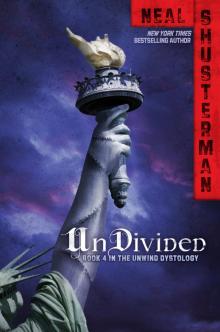 UnDivided
UnDivided UnBound
UnBound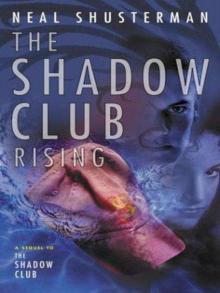 The Shadow Club Rising
The Shadow Club Rising Scorpion Shards
Scorpion Shards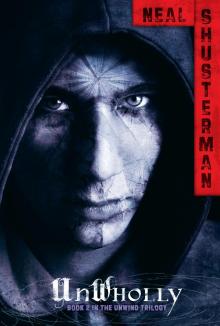 UnWholly
UnWholly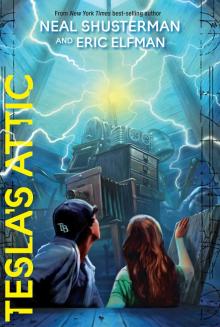 Tesla's Attic
Tesla's Attic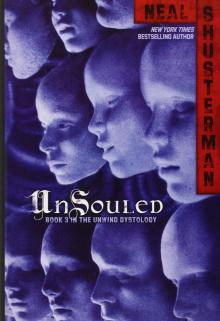 UnSouled
UnSouled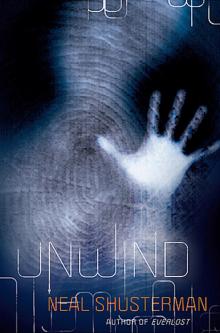 Unwind
Unwind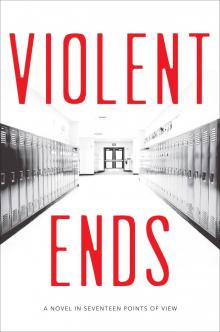 Violent Ends
Violent Ends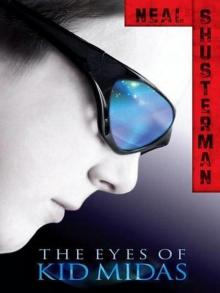 The Eyes of Kid Midas
The Eyes of Kid Midas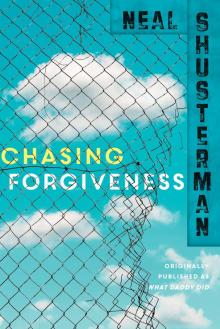 Chasing Forgiveness
Chasing Forgiveness Everfound
Everfound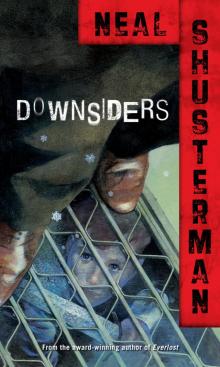 Downsiders
Downsiders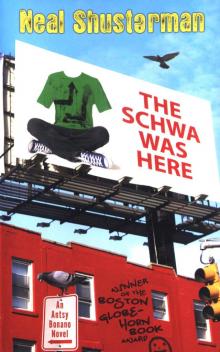 The Schwa Was Here
The Schwa Was Here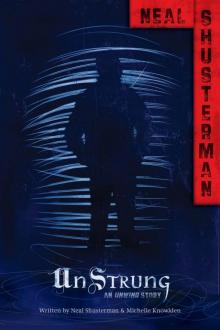 UnStrung
UnStrung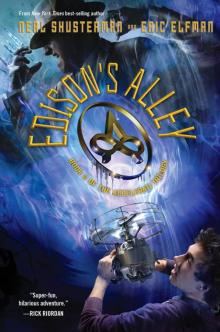 Edison's Alley
Edison's Alley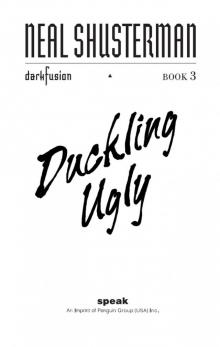 Duckling Ugly
Duckling Ugly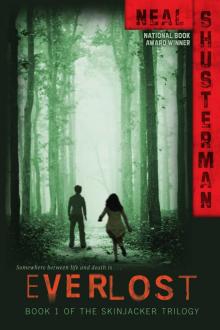 Everlost
Everlost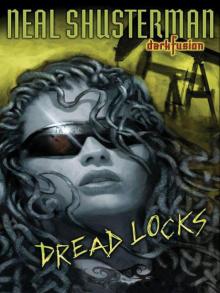 Dread Locks
Dread Locks Antsy Floats
Antsy Floats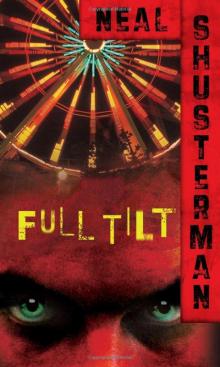 Full Tilt
Full Tilt Thunderhead
Thunderhead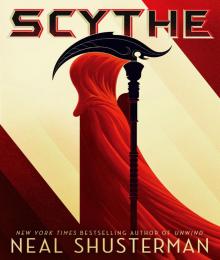 Scythe
Scythe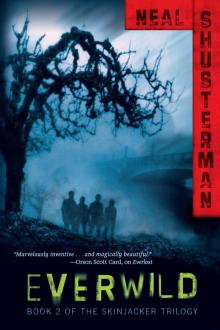 Everwild
Everwild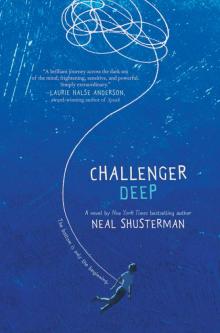 Challenger Deep
Challenger Deep Shattered Sky
Shattered Sky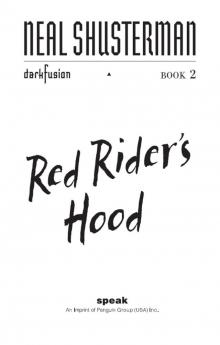 Red Rider's Hood
Red Rider's Hood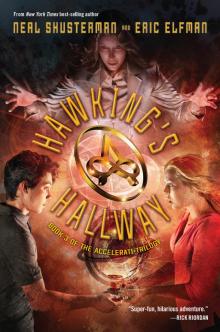 Hawking's Hallway
Hawking's Hallway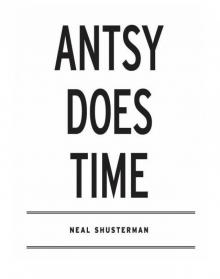 Antsy Does Time
Antsy Does Time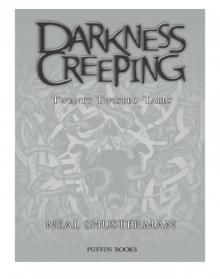 Darkness Creeping: Twenty Twisted Tales
Darkness Creeping: Twenty Twisted Tales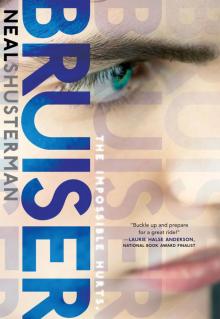 Bruiser
Bruiser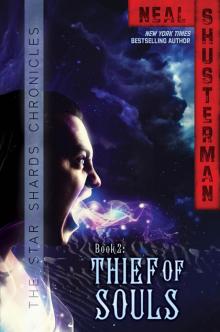 Thief of Souls
Thief of Souls The Toll
The Toll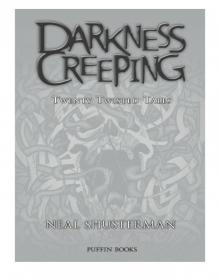 Darkness Creeping
Darkness Creeping Resurrection Bay
Resurrection Bay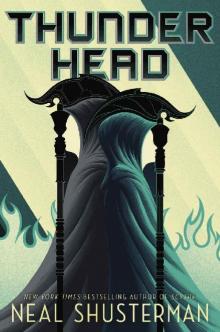 Thunderhead (Arc of a Scythe Book 2)
Thunderhead (Arc of a Scythe Book 2)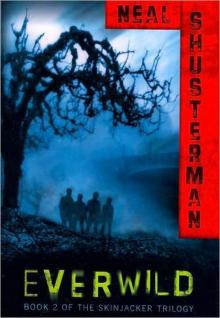 Everwild (The Skinjacker Trilogy)
Everwild (The Skinjacker Trilogy) Everfound s-3
Everfound s-3 Edison’s Alley
Edison’s Alley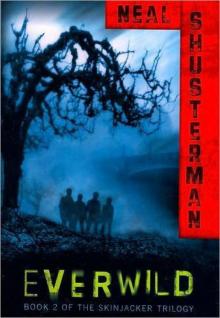 Everwild s-2
Everwild s-2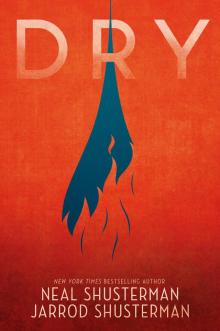 Dry
Dry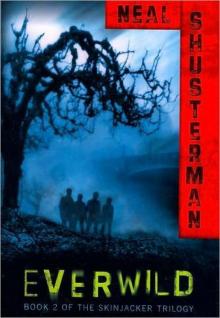 Skinjacker 02 Everwild
Skinjacker 02 Everwild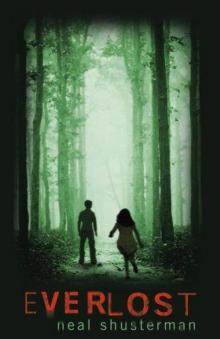 Everlost s-1
Everlost s-1